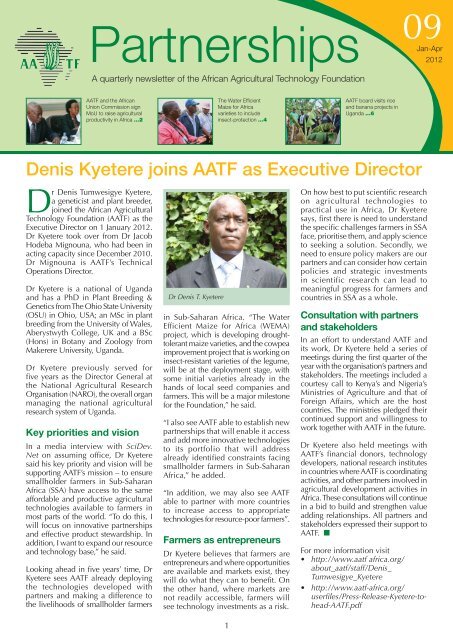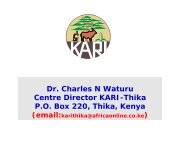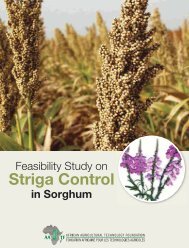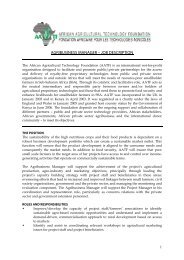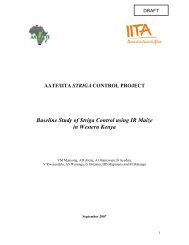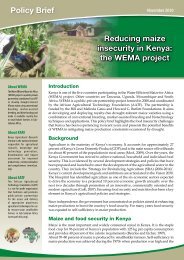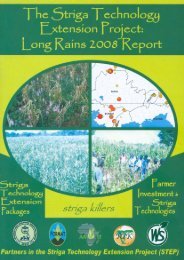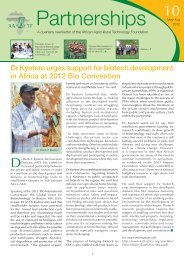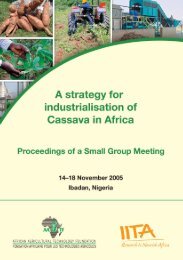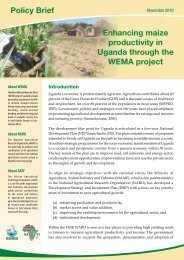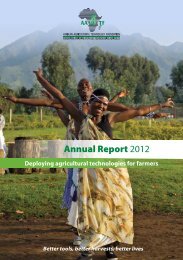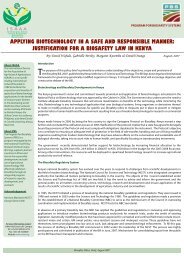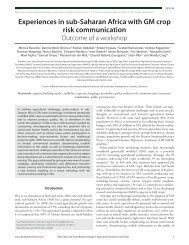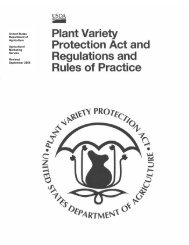Partnerships Issue 9 - African Agricultural Technology Foundation
Partnerships Issue 9 - African Agricultural Technology Foundation
Partnerships Issue 9 - African Agricultural Technology Foundation
You also want an ePaper? Increase the reach of your titles
YUMPU automatically turns print PDFs into web optimized ePapers that Google loves.
<strong>Partnerships</strong><br />
09<br />
Jan-Apr<br />
2012<br />
A quarterly newsletter of the <strong>African</strong> <strong>Agricultural</strong> <strong>Technology</strong> <strong>Foundation</strong><br />
AATF and the <strong>African</strong><br />
Union Commission sign<br />
MoU to raise agricultural<br />
productivity in Africa ...2<br />
The Water Efficient<br />
Maize for Africa<br />
varieties to include<br />
insect-protection ...4<br />
AATF board visits rice<br />
and banana projects in<br />
Uganda ...6<br />
Denis Kyetere joins AATF as Executive Director<br />
Dr Denis Tumwesigye Kyetere,<br />
a geneticist and plant breeder,<br />
joined the <strong>African</strong> <strong>Agricultural</strong><br />
<strong>Technology</strong> <strong>Foundation</strong> (AATF) as the<br />
Executive Director on 1 January 2012.<br />
Dr Kyetere took over from Dr Jacob<br />
Hodeba Mignouna, who had been in<br />
acting capacity since December 2010.<br />
Dr Mignouna is AATF’s Technical<br />
Operations Director.<br />
Dr Kyetere is a national of Uganda<br />
and has a PhD in Plant Breeding &<br />
Genetics from The Ohio State University<br />
(OSU) in Ohio, USA; an MSc in plant<br />
breeding from the University of Wales,<br />
Aberystwyth College, UK and a BSc<br />
(Hons) in Botany and Zoology from<br />
Makerere University, Uganda.<br />
Dr Kyetere previously served for<br />
five years as the Director General at<br />
the National <strong>Agricultural</strong> Research<br />
Organisation (NARO), the overall organ<br />
managing the national agricultural<br />
research system of Uganda.<br />
Key priorities and vision<br />
In a media interview with SciDev.<br />
Net on assuming office, Dr Kyetere<br />
said his key priority and vision will be<br />
supporting AATF’s mission – to ensure<br />
smallholder farmers in Sub-Saharan<br />
Africa (SSA) have access to the same<br />
affordable and productive agricultural<br />
technologies available to farmers in<br />
most parts of the world. “To do this, I<br />
will focus on innovative partnerships<br />
and effective product stewardship. In<br />
addition, I want to expand our resource<br />
and technology base,” he said.<br />
Looking ahead in five years’ time, Dr<br />
Kyetere sees AATF already deploying<br />
the technologies developed with<br />
partners and making a difference to<br />
the livelihoods of smallholder farmers<br />
Dr Denis T. Kyetere<br />
in Sub-Saharan Africa. “The Water<br />
Efficient Maize for Africa (WEMA)<br />
project, which is developing droughttolerant<br />
maize varieties, and the cowpea<br />
improvement project that is working on<br />
insect-resistant varieties of the legume,<br />
will be at the deployment stage, with<br />
some initial varieties already in the<br />
hands of local seed companies and<br />
farmers. This will be a major milestone<br />
for the <strong>Foundation</strong>,” he said.<br />
“I also see AATF able to establish new<br />
partnerships that will enable it access<br />
and add more innovative technologies<br />
to its portfolio that will address<br />
already identified constraints facing<br />
smallholder farmers in Sub-Saharan<br />
Africa,” he added.<br />
“In addition, we may also see AATF<br />
able to partner with more countries<br />
to increase access to appropriate<br />
technologies for resource-poor farmers”.<br />
Farmers as entrepreneurs<br />
Dr Kyetere believes that farmers are<br />
entrepreneurs and where opportunities<br />
are available and markets exist, they<br />
will do what they can to benefit. On<br />
the other hand, where markets are<br />
not readily accessible, farmers will<br />
see technology investments as a risk.<br />
1<br />
On how best to put scientific research<br />
on agricultural technologies to<br />
practical use in Africa, Dr Kyetere<br />
says, first there is need to understand<br />
the specific challenges farmers in SSA<br />
face, prioritise them, and apply science<br />
to seeking a solution. Secondly, we<br />
need to ensure policy makers are our<br />
partners and can consider how certain<br />
policies and strategic investments<br />
in scientific research can lead to<br />
meaningful progress for farmers and<br />
countries in SSA as a whole.<br />
Consultation with partners<br />
and stakeholders<br />
In an effort to understand AATF and<br />
its work, Dr Kyetere held a series of<br />
meetings during the first quarter of the<br />
year with the organisation’s partners and<br />
stakeholders. The meetings included a<br />
courtesy call to Kenya’s and Nigeria’s<br />
Ministries of Agriculture and that of<br />
Foreign Affairs, which are the host<br />
countries. The ministries pledged their<br />
continued support and willingness to<br />
work together with AATF in the future.<br />
Dr Kyetere also held meetings with<br />
AATF’s financial donors, technology<br />
developers, national research institutes<br />
in countries where AATF is coordinating<br />
activities, and other partners involved in<br />
agricultural development activities in<br />
Africa. These consultations will continue<br />
in a bid to build and strengthen value<br />
adding relationships. All partners and<br />
stakeholders expressed their support to<br />
AATF. n<br />
For more information visit<br />
• http://www.aatf africa.org/<br />
about_aatf/staff/Denis_<br />
Tumwesigye_Kyetere<br />
• http://www.aatf-africa.org/<br />
userfiles/Press-Release-Kyetere-tohead-AATF.pdf
AATF enters into strategic partnerships to improve<br />
Saharan Africa<br />
During the period, AATF<br />
signed Memorandums of<br />
Understanding (MoUs) with<br />
various key players in the agricultural<br />
sector to improve technology access<br />
for smallholder farmers in Sub-<br />
Saharan Africa.<br />
AATF and the <strong>African</strong><br />
Union Commission sign<br />
MoU to raise agricultural<br />
productivity in Africa<br />
The AATF and the Africa Union<br />
Commission signed a Memorandum<br />
of Understanding (MoU) in January<br />
2012 that will see the mainstreaming<br />
of AATF activities into the<br />
Comprehensive Africa <strong>Agricultural</strong><br />
Development Programme (CADDP)<br />
process. Through the MoU, the<br />
AU Commission and AATF will<br />
work together to raise agricultural<br />
productivity in Africa through<br />
technology access, development,<br />
delivery and uptake. The collaboration<br />
will facilitate the deployment of<br />
proven technologies to help address<br />
the constraints faced by smallholder<br />
<strong>African</strong> farmers.<br />
“We recognise and appreciate the<br />
contribution that AATF is making<br />
Dr Denis Kyetere, HE Mrs Rhoda Tumusiime and HE Dr Ibrahim Miyaki, the Chief Executive<br />
Officer NEPAD during the MoU signing ceremony in Addis Ababa in January 2012<br />
towards Africa’s agricultural<br />
development. The signing of the MoU<br />
is testimony to a mutual aspiration<br />
to work together to sustain the<br />
economic backbone of the continent<br />
and its peoples especially those who<br />
depend on agriculture and associated<br />
appropriate technologies for their<br />
livelihoods,” said Mrs Rhoda Peace<br />
Tumusiime, the Commissioner for<br />
Rural Economy and Agriculture of the<br />
AU Commission during the signing of<br />
the agreement at the AU headquarters<br />
in Addis Ababa, Ethiopia.<br />
“AATF’s mission to access and deliver<br />
agricultural technologies for use<br />
by smallholder farmers in SSA is in<br />
full accord with the <strong>African</strong> Union<br />
Sirte Declaration on the challenges<br />
of implementing integrated and<br />
sustainable development on agriculture<br />
and water in Africa,” said Dr Kyetere,<br />
the Executive Director of AATF. n<br />
For more information, visit http://<br />
www.aatf-africa.org/news__events/<br />
press_releases/en/ or contact Nancy<br />
Muchiri (n.muchiri@aatf-africa.org)<br />
AATF and AFSTA to work together to improve seed uptake<br />
In February 2012, AATF and the<br />
<strong>African</strong> Seed Traders Association<br />
(AFSTA) based in Nairobi signed a<br />
Memorandum of Understanding (MoU)<br />
that will support seed uptake and<br />
distribution. The two organisations will<br />
work together to facilitate technology<br />
transfer and commercialisation of new<br />
crop varieties to help achieve food<br />
security and alleviate poverty in Sub-<br />
Saharan Africa (SSA). The collaboration<br />
will facilitate the delivery of certified<br />
seed varieties of new and better<br />
crop varieties emanating from AATF<br />
coordinated projects that will help<br />
smallholder farmers improve their<br />
yields.<br />
AFSTA’s core mandates are to promote<br />
trade in quality seeds and to champion<br />
interests of the private seed industry<br />
in Africa. The Association currently<br />
represents over 46 individual seed<br />
Dr Justin Rakotoarisaona, the Secretary General, AFSTA and Dr Denis Kyetere, the<br />
Executive Director AATF exchange the MoU documents at the signing ceremony in<br />
Nairobi in February 2012<br />
companies and 26 national seed<br />
trade associations both from within<br />
and outside Africa. n<br />
2<br />
For more information, contact Gospel<br />
Omanya (g.omanya@aatf-africa.org)
technology access for smallholder farmers in Sub-<br />
ICIPE and AATF in new<br />
partnership to boost Striga<br />
control efforts in Kenya<br />
The International Centre for Insect<br />
Physiology and Ecology (ICIPE)<br />
and AATF in March 2012 signed<br />
a Partnership Agreement under the<br />
Integrated Striga Management in Africa<br />
(ISMA) project that is supported by the<br />
Bill & Melinda Gates <strong>Foundation</strong>. The<br />
agreement will see AATF and ICIPE<br />
undertake a survey on Striga weed<br />
management technologies in Kenya.<br />
The Striga weed is a highly invasive<br />
parasitic weed that attacks cereal<br />
crops. The infestation of Striga causes<br />
between 20 percent and 100 percent<br />
grain yield loss in many fields in<br />
Western Kenya, affecting over 250,000<br />
hectares. It is estimated that farmers<br />
lose 300,000 tonnes (3.3 million bags<br />
or US$ 132 million) of maize grain<br />
every year in the region. n<br />
Dr Christian Borgemeister, the Director General ICIPE and Dr Denis Kyetere, the<br />
Executive Director AATF during the signing of the partnership to work together under<br />
the ISMA project in March 2012 in Nairobi<br />
For more information visit http://www.aatf-africa.org/news/new_partnership_for_<br />
aatf_and_icipe/en/ contact Gospel Omanya (g.omanya@aatf-africa.org)<br />
Japan Tobacco grants AATF access to transformation technology for NEWEST rice<br />
project<br />
Japan Tobacco (JT) has granted the Nitrogen Use<br />
Efficient Water Use Efficient and Salt Tolerant<br />
(NEWEST) Rice Project access to its PureIntro® plant<br />
transformation technology. The licence agreement<br />
allowing AATF to access the technology for the project<br />
was signed between JT and AATF in March 2012.<br />
The NEWEST project seeks to address some of the<br />
major constraints that face rice production in Sub-<br />
Saharan Africa. The project is transforming some<br />
varieties from the New Rice for Africa (NERICA)<br />
project to improve their productivity in nitrogenpoor<br />
soils, drought prone regions and in fields that<br />
have become excessively salty over time and provide<br />
smallholder rice farmers with higher yielding varieties<br />
that are well adapted to the upland and lowland ricegrowing<br />
areas in Africa.<br />
The PureIntro® is an agrobacterium-mediated<br />
plant transformation technology that is recognised<br />
worldwide as the standard transformation system.<br />
The technology reduces development costs and<br />
time. PureIntro® has been licensed by JT to around<br />
50 private and public entities worldwide for numerous<br />
crops including maize, rice, wheat, barley, sorghum,<br />
banana, sugarcane, switchgrass, miscanthus and turf.<br />
n<br />
For more information, contact Jacob Mignouna<br />
(j.mignouna@aatf-africa.org)<br />
The PutreIntro plant transformation technology from Japan Tobacco<br />
will be used to develop nitrogen use efficient, water use efficient and<br />
salt tolerant rice that will improve rice production in Sub-Saharan<br />
Africa<br />
3
AATF projects report progress at the 2012 review<br />
Dr James Gethi, the WEMA Kenya country coordinator shares his experience with farmers in Limpopo, South Africa during a field trip in<br />
February 2012 held alongside the 2012 planning and review meeting<br />
During the first quarter of the<br />
year, various projects held<br />
their annual review and<br />
planning meetings.<br />
The Water Efficient Maize<br />
for Africa varieties to<br />
include insect-protection<br />
The Water Efficient Maize for Africa<br />
(WEMA) project held its 4 th annual<br />
review meeting in Polokwane, South<br />
Africa in February 2012 where<br />
significant progress was reported by all<br />
project partners since the last meeting<br />
held in February 2011. In 2011, the<br />
project submitted two conventional<br />
drought-tolerant hybrids into National<br />
Performance Trials in Kenya. In 2011<br />
Kenya and Uganda, two of the five<br />
project countries, successfully carried<br />
out the second round of confined field<br />
trials for the drought-tolerant maize<br />
varieties. South Africa, also one of the<br />
countries, did its third round of confined<br />
field trials. It was also reported that as a<br />
result of the research and development<br />
results from the last four years, the<br />
project realised the need to include<br />
insect protection in the drought-tolerant<br />
varieties to guarantee smallholder<br />
farmers the expected yield during<br />
moderate drought. n<br />
For more information visit http://<br />
w w w. a a t f - a f r i c a . o r g / w e m a /<br />
wemareportmay2012 or, contact<br />
Sylvester Oikeh (s.oikeh@aatf-africa.<br />
org)<br />
The Maruca-Resistant Cowpea project identifies promising lines<br />
The Maruca-Resistant Cowpea project partners<br />
met in Accra, Ghana in March 2012 to review<br />
progress made in the three project countries of<br />
Nigeria, Ghana and Burkina Faso in 2011. During<br />
the meeting, it was reported that Nigeria had<br />
successfully held its third round of confined field<br />
trials (CFTs) with Burkina Faso conducting its first.<br />
Results from these CFTs show that both were very<br />
successful and have clearly indicated that there are<br />
at least two cowpea lines from which to choose for<br />
backcrossing and further biosafety and molecular<br />
studies. Ghana has submitted its application to the<br />
country’s national biosafety authority to conduct<br />
similar trials. The trials are expected to begin in<br />
2012. n<br />
For more information, contact Jacob Mignouna<br />
(j.mignouna@aatf-africa.org)<br />
Cowpea Project Partners during the meeting in Accra, Ghana in March<br />
2012<br />
4
and planning meetings<br />
ISMA project partners and staff from Kenya Seed Company pose for a group photograph with the seed treater in the background<br />
during the handover ceremony in February 2012<br />
The Striga Control in Maize Project to upscale demonstrations<br />
Partners involved in the Striga<br />
Control in Maize project met in<br />
Kisumu, Kenya in January 2012<br />
to plan activities that would upscale the<br />
use of Imazapyr Resistant (IR) maize<br />
during 2012. The partners consisting<br />
of representatives from community<br />
based organisations (CBOs) and seed<br />
company representatives involved in<br />
the project implementation agreed to<br />
set-up more demonstration plots and<br />
hold farmer field days in areas with<br />
heavy Striga infestation to create more<br />
awareness on the problem and the<br />
solutions available.<br />
During the same month, AATF also<br />
participated in a review and planning<br />
meeting that was held alongside a<br />
stakeholders’ forum for the Integrated<br />
Striga Management in Africa (ISMA)<br />
project. Participants at the two<br />
meetings were drawn from the key<br />
partner organisations participating<br />
in the project. These included AATF,<br />
the International Institute of Tropical<br />
Agriculture (IITA), the International<br />
Centre for Maize and Wheat<br />
Improvement Center (CIMMYT),<br />
the International Centre for Insect<br />
Physiology and Ecology (ICIPE),<br />
and the Tropical Soil Biology and<br />
Fertility Institute of the International<br />
Center for Tropical Agriculture (TSBF-<br />
CIAT), Ministry of Agriculture, seed<br />
companies and CBOs. The four-year<br />
ISMA project was launched in June<br />
2011 and is focusing on improving<br />
and expanding access to methods<br />
of Striga control, while supporting<br />
on-farm research to identify the<br />
most effective means of controlling<br />
the parasitic weed under varying<br />
conditions.<br />
The project is evaluating and<br />
implementing five approaches:<br />
i. using herbicide-coated seeds (IR<br />
maize)<br />
ii. using Striga-resistant maize crop<br />
varieties<br />
iii. using a “push-pull” technology<br />
that involves intercropping with<br />
5<br />
specific forage legumes that<br />
inhibit the germination of Striga<br />
iv. using soybeans and groundnuts<br />
as a trap crop<br />
v. deploying bio-control of Striga.<br />
During this period, the availability of<br />
IR maize seed to farmers in western<br />
Kenya was boosted by the donation<br />
of a seed treater machine to the Kenya<br />
Seed Company (KSC) in February<br />
2012. The seed processing facility<br />
purchase by CIMMYT was facilitated<br />
with financial and technical support<br />
from the Bill & Melinda Gates<br />
<strong>Foundation</strong> and BASF, respectively<br />
as part of the ISMA project. The seed<br />
treater costing USD 30,000 will<br />
facilitate the KSC to produce IR maize<br />
seed targeting resource poor farmers<br />
in western Kenya who are facing the<br />
threat of Striga weed infestation on<br />
their farms. n<br />
For more information, contact Gospel<br />
Omanya (g.omanya@aatf-africa.org)
News<br />
AATF board visits rice and banana projects in Uganda<br />
The AATF Board of Trustee<br />
members visited the rice and<br />
banana projects located at<br />
NARO, Uganda research stations<br />
in Namulonge and Kawanda. The<br />
visit was held alongside the Board’s<br />
meeting held in Kampala in April<br />
2012.<br />
Aflatoxin control project<br />
receives approval for onfarm<br />
testing in Kenya<br />
Th e C o n t r o l o f A f l a t o x i n<br />
Contamination in Maize and Peanuts<br />
project has received approval from the<br />
Kenya Standing Technical Committee<br />
on Import and Export (KSTCIE) to do<br />
on-farm testing of aflasafeKE01 on<br />
maize in Kenya. Food grains especially<br />
maize and peanuts are susceptible to<br />
aflatoxin contamination posing great<br />
risk to people who rely on them for<br />
food. Aflatoxin exposure provides a<br />
challenge in efforts to address food<br />
insecurity and improve people’s<br />
health.<br />
Aflasafe, a natural biocontrol solution<br />
developed by the United States<br />
Department of Agriculture-<strong>Agricultural</strong><br />
Research Service (USDA-ARS) reduces<br />
aflatoxin contamination and is already<br />
in use in the USA. The International<br />
Institute of Tropical Agriculture (IITA)<br />
and USDA-ARS have successfully<br />
adapted the technology for use in<br />
Nigeria with results showing reduced<br />
contamination in maize and peanuts<br />
by upto 80–90 percent. AflasafeKE01<br />
is a natural product that can reduce<br />
aflatoxin contamination of crops and<br />
has been developed in Kenya by the<br />
Kenya <strong>Agricultural</strong> Research Institute<br />
(KARI) in partnership with the AATF,<br />
IITA and USDA-ARS.The on-farm<br />
testing scheduled for May 2012 will<br />
involve a total of 400 farmers spread<br />
within eastern Kenya, and Bura and<br />
Tana River districts.<br />
In a related event, the Partnership for<br />
Aflatoxin Control in Africa (PACA) in<br />
March 2012, provided funding for<br />
commencement of biocontrol work<br />
in Tanzania. Dr Jacob Mignouna of<br />
AATF, Dr Peter Cotty of the USDA and<br />
Dr Ranajit Bandyopadhyay from IITA<br />
AATF Board members during a field visit to the Banana project confined field trial site in<br />
NARO Uganda’s Kawanda Research Institute<br />
met Tanzania’s Ministry of Agriculture<br />
and the Tanzania Food and Drugs<br />
Authority officials on the same. n<br />
For more information, contact Charity<br />
Mutegi (c.mutegi@cgiar.org)<br />
A farmer selects maize cobs for testing aflatoxin contamination in Nigeria<br />
6
New members join the AATF Board<br />
Dr Jikun Huang and Dr Stan Blade joined the AATF<br />
Board of Trustees in November 2011 and March 2012<br />
respectively. They will each serve for a term of three years.<br />
In addition, Dr Blade was appointed to serve as Vice-Chair<br />
to the Board during the last Board meeting held in April<br />
2012 in Kampala Uganda.<br />
Dr Stanford F Blade,<br />
is the Chief Executive<br />
Officer of the Alberta<br />
I n n o v a t e s B i o<br />
Solutions Corporation<br />
(AI-Bio), Canada – a<br />
provincial government<br />
agency that leads and<br />
coordinates science<br />
and innovation to grow<br />
prosperity in Alberta’s<br />
agriculture, food and<br />
forestry sectors – and an<br />
Adjunct Professor in the<br />
Faculty of Agriculture,<br />
Life and Environmental<br />
S c i e n c e s a t t h e<br />
University of Alberta.<br />
He previously served as the Deputy Director General<br />
(Research) for the International Institute of Tropical<br />
Agriculture (IITA). (for more information on Dr Blade visit<br />
http://www.aatf-africa.org/about_aatf/board_of_trustees/<br />
Blade)<br />
Dr Jikun Huang is an<br />
<strong>Agricultural</strong> Economist<br />
and is the founder and<br />
Director of the Center<br />
for Chinese <strong>Agricultural</strong><br />
Policy of the Chinese<br />
Academy of Sciences,<br />
and a professor<br />
at the Institute of<br />
Geographical Sciences<br />
and Natural Resources<br />
Research. He is also<br />
vice president of the<br />
Chinese Association of<br />
<strong>Agricultural</strong> Economics<br />
and Chinese Association<br />
of Agro-<strong>Technology</strong><br />
Economics, member of<br />
International Food and <strong>Agricultural</strong> Trade Policy Council,<br />
and council member of Global Agenda (World Economic<br />
Forum). His research covers a wide range of issues on<br />
China’s agricultural and rural development (for more<br />
information on Dr Huang visit http://www.aatf-africa.<br />
org/about_aatf/board_of_trustees/jikun).<br />
New Staff<br />
In an effort to strengthen the capacity of AATF to deliver on<br />
its mandate, six new staff members joined AATF towards<br />
the end of 2011 and early 2012.<br />
Jane Achando, was<br />
appointed Associate Legal<br />
Officer for AATF where she<br />
is responsible for assisting<br />
the Legal Counsel with<br />
corporate compliance<br />
functions and managing<br />
the AATF <strong>Technology</strong> and<br />
Innovation Support Centre<br />
among others. Jane is an<br />
Advocate of the High Court<br />
of Kenya and holds a Masters<br />
in Business Administration<br />
from the Kenya Methodist<br />
University, a Post Graduate<br />
Diploma in Law from the Kenya School of Law and a<br />
Bachelors of Law (LLB) from the University of South<br />
Africa. Prior to joining AATF she worked at Family Health<br />
International (Kenya) as a Contract and Grants Consultant.<br />
Peter Musyoka, an<br />
agricultural economist<br />
joined AATF as a Programme<br />
Officer in the Seed System<br />
Unit, where he is responsible<br />
for technology deployment.<br />
He holds a Bachelor’s<br />
degree in <strong>Agricultural</strong><br />
Economics and a Master’s<br />
degree in <strong>Agricultural</strong> and<br />
Applied Economics from<br />
Egerton University, Kenya.<br />
Before joining AATF, Peter<br />
worked with the Ministry<br />
of Agriculture in Kenya as<br />
District Agribusiness Development Officer.<br />
Pauline Mundia is the<br />
Programme Assistant at AATF<br />
responsible for providing<br />
support to management<br />
of AATF projects portfolio,<br />
administrative support to the<br />
technical team and the coordination<br />
of the Technical<br />
Operations Department.<br />
Pauline who previously<br />
worked for the Ministry of<br />
Agriculture as a District<br />
Crops Development Officer<br />
holds a BSc. (Hons) degree<br />
in Horticulture from Egerton<br />
University and an MSc. Horticulture degree from Jomo<br />
Kenyatta University of Agriculture and <strong>Technology</strong> both in<br />
Kenya.<br />
7
Francis Onyekachi joined<br />
AATF as the Programme<br />
Officer for the Maruca-<br />
Resistant Cowpea Project.<br />
He holds a B.Agric (Animal<br />
Science and Animal Health)<br />
from the University of<br />
Agriculture, Umudike,<br />
Nigeria, and a Masters<br />
in Human Development<br />
and Food Security from<br />
the University of Rome<br />
(Roma Tre). Before joining<br />
AATF, Francis who is<br />
based in AATF’s Nigeria<br />
office, worked for the International Fund for <strong>Agricultural</strong><br />
Development (IFAD).<br />
Joseph Ndwiga joined AATF<br />
as Programme Officer-<br />
Agri-Business where he is<br />
responsible for supporting<br />
AATF business processes<br />
t h r o u g h s u p p o r t i n g<br />
the implementation of<br />
monitoring and evaluation.<br />
Joseph is a development<br />
scientist with an MA<br />
degree in Project Planning<br />
and Management from the<br />
University of Nairobi, and<br />
a BSc Degree in <strong>Agricultural</strong><br />
Economics from Egerton<br />
University, Kenya. Before joining AATF, Joseph was Head<br />
of Monitoring and Evaluation at the Kenya Forest Service.<br />
Rosemary Nzuki joined AATF as<br />
Project Communications Officer for<br />
the Water Efficient Maize for Africa<br />
Project. Rosemary joins AATF after<br />
working with World Vision Kenya<br />
(WVK) for five years where she was<br />
the Public Relations and Marketing<br />
Officer. She holds a Master of Arts<br />
degree in Communication from the<br />
University of Nairobi and a Bachelor<br />
of Commerce degree in Business<br />
Administration and Management<br />
from Daystar University in Kenya.<br />
AATF is now on facebook.<br />
Visit us at http://www.facebook.com/pages/<br />
<strong>African</strong>-<strong>Agricultural</strong>-<strong>Technology</strong>-<strong>Foundation</strong>-<br />
AATF/146735758725251<br />
<strong>Partnerships</strong> is a quarterly newsletter published by the <strong>African</strong> <strong>Agricultural</strong> <strong>Technology</strong> <strong>Foundation</strong> (AATF) in Nairobi, Kenya.<br />
Contact: Nancy N. Muchiri, Communications & <strong>Partnerships</strong> Unit, <strong>African</strong> <strong>Agricultural</strong> <strong>Technology</strong> <strong>Foundation</strong>,<br />
P.O. Box 30709-00100, Nairobi, Kenya. Tel. +254 20 422 3700; Fax: +254 20 422 3701; Via USA: Tel. + 1 650 833 6660 3700,<br />
Fax: +1 650 833 6661 3701.<br />
email: aatf@aatf-africa.org. Website: www.aatf-africa.org.<br />
© 2012. AATF encourages fair use of information in this newsletter provided the source is fully acknowledged.<br />
8


